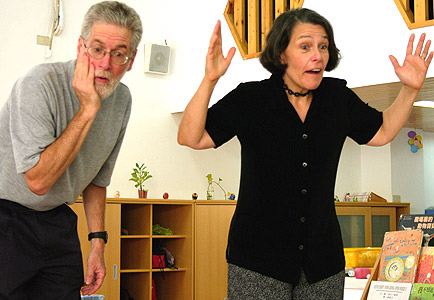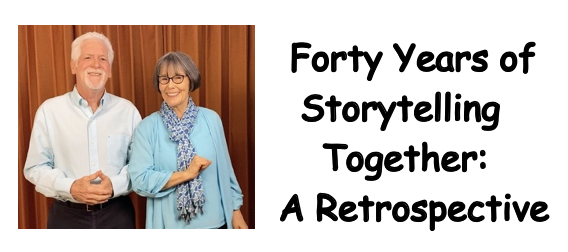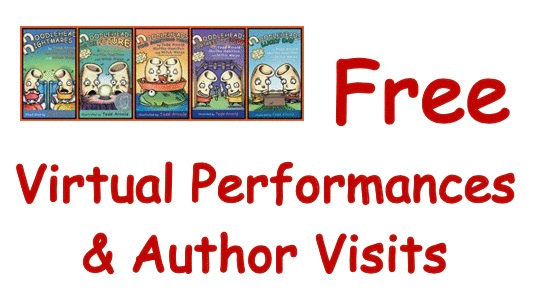FAQ
- How did you become storytellers?
- How did you get the name "Beauty & the Beast Storytellers"?
- Is this really your full-time job?
- Where have you traveled to tell stories?
- Can I learn to tell a story well even if my memory isn't great?
- Where can I learn more about storytelling?

How did you become storytellers?
Martha: When I was in graduate school to become a librarian I had a friend who was taking a storytelling course. Although I never heard her tell stories, it sounded like a lot of fun. I had entertained the idea of becoming a children's librarian but instead became a reference librarian at Elmira College and then Cornell University. Once while at a large library conference I mistakenly walked into a storytelling workshop. I loved what I heard and began to attend monthly meetings of a local storytelling group, although it took a whole year before I got the courage to tell my first story! I was eventually introduced to Mitch by a friend who told me, "Mitch may not know it, but he's a storyteller."
Mitch: I had majored in government as a student at Cornell, a field which some have jokingly commented seems "perfect for a storyteller." At the time I was introduced to Martha, I was one of the owners/workers at the cooperatively run Moosewood Restaurant, an Ithaca landmark because of its best-selling vegetarian cookbooks. One of our first dates was to attend a party of her storytelling group. For a good deal of the evening we sat in a circle and each person told a story. I was intrigued and anxious to learn a story. I learned three stories in the first few days after I met Martha. It's amazing what love will make you do! Our first public performance was at a winter storytelling festival in Ithaca.
When we began telling stories together in 1980 the storytelling renaissance in this country was in its infancy. Early on in our career we presented at The Clever Gretchen Conference, a children's literature and folklore gathering that was held for many years at Syracuse University. It was a turning point for us. We told stories for an audience of over one hundred librarians. Soon we were getting calls to appear at schools all over New York State. Not long after that we quit our other jobs and have been full-time storytellers ever since.
How did you get the name "Beauty & the Beast Storytellers"?
Once we started to get jobs we knew we needed a name for our group. We wanted a name that would make people think of storytelling and of us. One day a friend suggested "Beauty & the Beast." At first Martha didn't want to live up to always being "the Beauty" and Mitch wasn't thrilled about being labeled "the Beast." However, we began to think that if we never said which one was the Beauty and which the Beast, it would make for a fun introduction. Even thirty years later, we still have lots of fun with our intro. Years ago, two of our best friends gave us hand-painted bowls. One said "The Beauty" and the other "The Beast." They wanted to see which bowls we would eat out of. But to this day the secret has not been revealed . . .
Disney came along with the "Beauty and the Beast" movie ten years after we took the name, and it has confused things a bit at times. Some young listeners who've never heard us before seem to expect that we are going to turn into dancing teacups. But by the middle of our first tale, storytelling has worked its magic and they have already forgotten. Instead of watching Disney's animation they're making their own movies in their minds.
Is this really your full-time job?
It is indeed, and has been since 1983. We have never regretted the decision although it was scary at first. There are drawbacks to being self-employed (the office is always there and there's always something to do, you have to pay your own health insurance and establish your own pension plan, sometimes you have too much work and other times not enough, and so on), but it has afforded us a wonderful and fulfilling life. One great thing about our job is that it is extremely varied. We perform, teach, and write. It seems as if new and interesting venues are always opening up for us.
Where have you traveled to tell stories?
Our most recent interesting travels took us to Alaska where we did several school performances and presented workshops for the Alaska Reading Conference. We also visited Japan where we presented at international schools in various cities and did a workshop for the Society of Children Book Writers and Illustrators in Tokyo. For more information see What's New.
We've been to lots of other international schools in interesting places: Moscow, Budapest, Trieste, Munich, Prague, Vienna, Berlin, Taipei, Milan, Madrid, Thessaloniki, Sofia, Montreal, Bucharest, London, Zagreb, and Florence, to name a few. The students in these schools either already speak English or are in the process of learning it.
We also made three trips to Taiwan and Hong Kong to lead seminars for teachers of English and to tell stories for parents and children. For more information see What's New.
Can I learn to tell a story well even if my memory isn't great?
Of course you can. We can't remember where we put our keys even though we remember lots of stories! Everybody is a storyteller; you may just need some practice and confidence. Many people say to us, "I can't even remember a joke, so how am I going to tell a whole story?" The secret is to tell it right away. If you tell the story or joke to the first three people you see, you will remember it. If you know you won't see anyone right away, jot down a bare outline of the joke or story. Keep a tiny notebook with you at all times and you'll find that your repertoire grows quickly. The problem arises when you've heard a great joke or story and you don't have the perfect opportunity to tell it until a week or two has passed. Unless you've done something to reinforce it in your mind right away, it will be hard to remember it.
Where can I learn more about storytelling?
There are lots of good books to get you started. We recommend The Storyteller's Start-Up Book by Margaret Read MacDonald and Storyteller by Ramon Royal Ross. Both are available from www.augusthouse.com, which is a great source for books about storytelling. Be sure to check out our Books and Recordings. Children Tell Stories will guide you in how to become a good storyteller as well as how to teach it to others. Our anthologies are good sources of stories for beginning (and advanced) tellers. If kids can tell them, you certainly can!
We also recommend that you go to www.storynet.org, the site of the National Storytelling Network, the national guild for storytellers. If you scroll down their home page you will not only find a link to their discussion of how to become a storyteller, but also many other useful links including storytelling events and workshops in your area. In addition, they have put out a small booklet called A Beginner's Guide to Storytelling that is a compendium of advice from seasoned tellers. Harlynne Geisler's Storytelling Professionally: The Nuts and Bolts of a Working Performer is useful to those who wish to pursue storytelling as a career. It can be found on Amazon.

